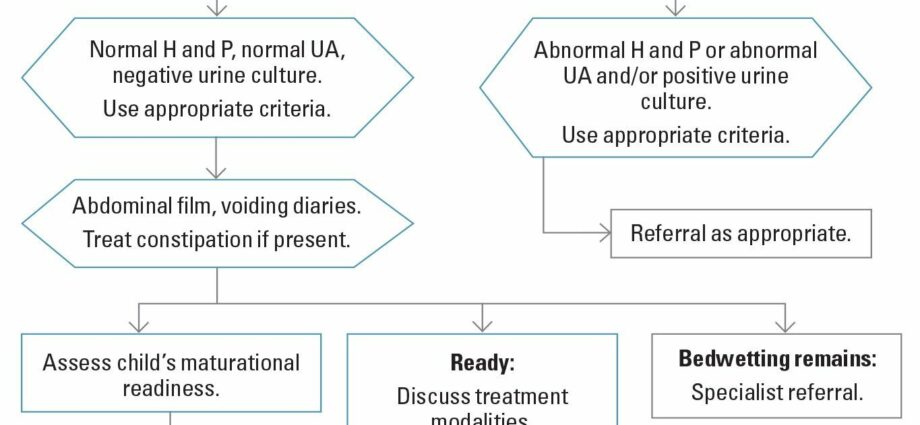Contents
Primary enuresis: definition
We call enuresis involuntary urination, occurring most often during the night, at an age when cleanliness is supposed to be fully acquired, in other words beyond 5 years. Primary enuresis occurs in a child who has never been able to control his bladder sphincters, while secondary enuresis occurs after at least six months of urinary continence, without “bedwetting” type accidents; that is to say in a child who begins to wet the bed again after having acquired a cleanliness.
What are the causes of primary enuresis in children?
In an enuretic child, primary enuresis may be related to:
- delayed bladder maturation;
- nocturnal polyuria, that is to say too much urine production during the night due to a decrease in the production of the anti-diuretic hormone;
- a smaller than average or overactive bladder;
- a higher “wakefulness threshold”, ie a child who wakes up more difficult in the middle of the night, when he is in deep sleep, and a need to urinate is not enough to interrupt;
- a familial predisposition and therefore hereditary genetic factors, with enuresis in ascending persons in 30 to 60% of cases.
Note that certain psychological or socio-family factors can trigger, maintain or worsen enuresis.
Is it always daytime or nighttime?
Bedwetting is usually nocturnal, daytime bedwetting rather a form of urinary incontinence, with urine leakage, or urinary tract infections. THE’diurnal primary enuresis may be a sign of an underlying condition, such as diabetes, or related to delayed bladder development. When it is both diurnal and nocturnal, primary enuresis should prompt consultation to identify the cause (s), and manage it accordingly.
What is the difference between primary and secondary enuresis?
Bedwetting is primary if it has not been preceded by an episode of cleanliness, a period in which the child has been clean for at least six months.
When enuresis occurs after a period when the child has been clean, it is called secondary enuresis. This usually begins between 5 and 7 years old, but can also occur later, especially in adolescence.
Treatments and solutions for primary enuresis
Treatment of enuresis is based first of all on the establishment of hygiene-dietetic measures simple, such as monitoring how much you drink before bed, and getting into the habit of going to the bathroom before going to bed.
Educational measures, such as keeping a voiding calendar, with “dry” nights and “wet” nights, may also be effective against bedwetting. The “stop pee”, an alarm system aimed at waking the child from the first drop of urine in his diaper, is controversial but can also work.
At the drug level, the main treatment prescribed is desmopressin (Minirin®, Nocutil®), but it is not systematic.
Which specialist to consult?
Initially, faced with primary enuresis in children, a general practitioner or pediatrician will be consulted, who will look for the possible cause (s), and will rule out or not the diagnosis of primary nocturnal enuresis associated with diurnal voiding disorders. or daytime enuresis. Because the management is not the same if it is an isolated primary nocturnal enuresis (ENPI) or a nocturnal enuresis associated with a diurnal form. General practitioner or pediatrician are quite able to treat primary enuresis if it is not associated with a complex pathology or psychological causes. The healthcare professional will then refer to a colleague (urologist, pediatric surgeon, child psychiatrist, psychologist, etc.) if the enuresis requires more specific follow-up.
Homeopathy is it effective?
There are undoubtedly many testimonies indicating that homeopathy made it possible to put an end to primary enuresis. However, complementary therapies such as hypnosis, homeopathy, acupuncture or chiropractic have not proven their effectiveness, at least according to the French Association of Urology. There are many studies on this subject, but the association considers them not very rigorous at the methodological level. But nothing prevents trying, especially in parallel or in case of failure of conventional treatments.
Can primary enuresis affect adults?
By its very definition, primary enuresis does not affect adults. In an adult, involuntary urination during the night that occurs unexpectedly will rather be considered secondary enuresis. Furthermore, we do not speak of enuresis when there is urinary incontinence, urine retention, urinary leakage or even polyuria in the context of a pathology (diabetes in particular). The delayed control of the bladder sphincter seen in people with motor or mental impairment is also not called primary enuresis.
Sources and additional information:
- https://www.urofrance.org/base-bibliographique/enuresie-nocturne-primaire-isolee-diagnostic-et-prise-en-charge-recommandations
- https://www.revmed.ch/RMS/2005/RMS-7/30196










